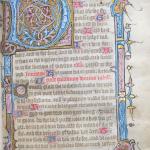PRIMER IN ENGLISH
Vellum, 8.25 x 5.75, ff. 95, 24 lines to a page. Late 14th cent., finely written, with good ornaments.
Donor, T. C. S. Priced 20s.
Collation : 110 (1, 2 canc.), 28 – 48 (wants 8) 58 – 128.
Contents :
Kalendar in English in red and black . . . f. 1
Table to find Easter, in red. 8b blank . . . 7
Hours of the Virgin (in English) . . . . 9
Domine labia. Lord {th}ow schalt opene my lyppes.
Fine initial : blue and pink foliage, heightened with white, on gold
ground : and border to each of the Hours. First leaf of Vespers
gone after f. 31.
On 39b : Title in large red letters.
Here bygynne{th} the seuene psalmes.
Seven Psalms. Fine initial and border . . . 40
Here bygynneth the fyftene psalmes . . . 45b
Litany, f. 51. f. 55 blank.
Office of the Dead (Placebo and Dirige). Initial and border . 56
Here bygynnith commendacion for alle crystene soules . 79
Beati immaculati in uia. Blessid be the unwemmed in the weye 79b
Initial and border.
Here bygynnith psalmes of the passyon . . . 87b
Deus deus meus, etc. God my god looke on me . . 88
Initial and border.
O intemerata. O unwemmed and wi{th} owten eende blessed . 94b
Ends 95b.
In the Kalendar are very few entries : Bride, Donston, Austyn of
engelonde, Edmond pownteneye (June 9), Albon, Swithyn (July 2),
S. thomas translation, Kyng richard (Rich. II) was crouned {th}e {y}er
of god 1377. (July 16), Kenelm. Gylys (Sept. 1). Antelyn (Sept. 2). Kalixte
(Oct. 14). Edmond powntenye (Nov. 16). Hughe of Lyncolne
(Nov. 16). Edmond {th}e kyng. The italicised names are in red.
In the Litany : Confessors : Cuthbert, Swythyn, Donston. Virgins :
Pernele, Radegounde, ffresewythe.
A good account of Primers will be found in Wordsworth and Littlehale’s Ancient Service Books of the English Church, 248 – 254.
Negative microfilm in St John's College Library.
Henry Littlehales (ed.), The prymer or prayer-book of the lay people in the Middle Ages in English, dating about 1400 A.D., edited with an introduction and notes from the manuscript (G.24) in St John's College, Cambridge (London, 1891)
